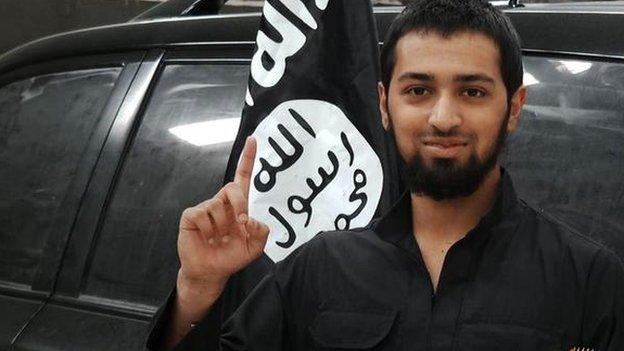Cameron warns of 'quietly condoning' IS ideology
- Published
David Cameron: "There are people who... buy into some of these prejudices, giving the extreme Islamism narrative weight and telling fellow Muslims, 'you are part of this'"
Prime Minister David Cameron has warned of the dangers posed by those who "quietly condone" Islamic State militants' extremist ideology.
Speaking at a security conference in Slovakia, he also stressed the importance of tackling radicalisation at its source.
Mr Cameron highlighted the role families and communities can play in countering such radicalisation.
His comments came as a UK family were reported to have travelled to Syria.
Bradford sisters Khadija, Sugra and Zohra Dawood crossed the border into Syria with their nine children earlier this week, an Islamic State (IS) smuggler has told the BBC.
And Talha Asmal, 17, from Dewsbury, West Yorkshire, is thought to have become the UK's youngest-ever suicide bomber when he reportedly blew himself up in Iraq on Saturday.
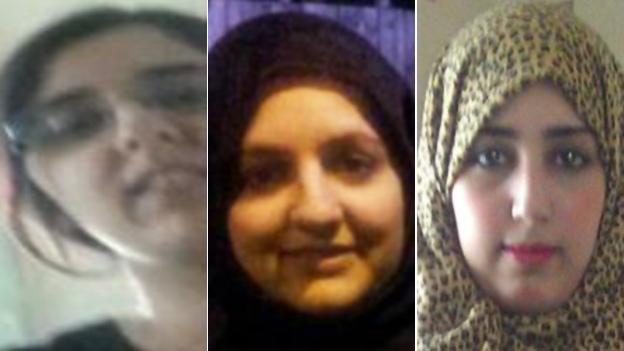
Sisters Sugra, Zohra and Khadija Dawood went missing on 9 June
The prime minister said IS was "one of the biggest threats the world has ever faced".
He said the police and intelligence agencies were not responsible for people deciding they wanted to go, and that recent cases show how young people from Britain are at risk of sliding towards violent extremism.
Mr Cameron said: "The cause is ideological. It is an Islamist extremist ideology, one that says the West is bad, that democracy is wrong, that women are inferior, that homosexuality is evil.
"It says religious doctrine trumps the rule of law and Caliphate trumps nation state and it justifies violence in asserting itself and achieving its aims. The question is: How do people arrive at this worldview?"
'Murderous intent'
He said one reason was members of the Muslim community who "don't go as far as advocating violence, but who do buy into some of these prejudices".
Mr Cameron said it "paves the way for young people to turn simmering prejudice into murderous intent", and to "go from listening to firebrand preachers online to boarding a plane to Istanbul and travelling onward to join the jihadis".
He acknowledged there were other factors that contributed to radicalisation, "not least questions of national identity and making sure young people in our country feel truly part of it".
A number of the families of men and women known to have travelled to Syria and Iraq - including the parents of 20-year-old Aqsa Mahmood from Glasgow - have said online grooming played a part in their decision to leave the UK.
However others, such as a friend of Talha Asmal, have said the idea that a teenager would cross borders solely because of online grooming "doesn't fit".
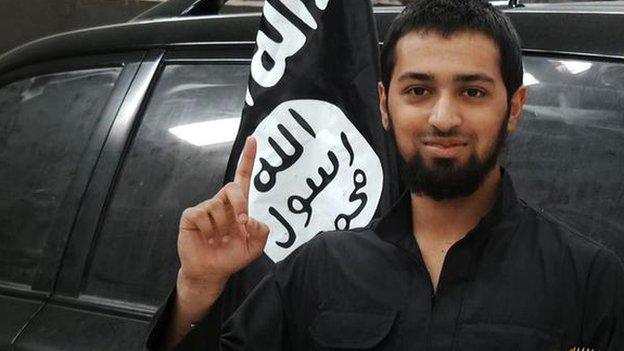
Islamic State posted pictures on Twitter of Talha Asmal preparing for the suicide attack
There was criticism of Cameron's speech from some quarters.
Former government minister and Conservative peer Baroness Warsi accused the government - and both previous coalition and Labour governments - of "disengagement" from the issues, because they considered some British Muslim groups to be "beyond the pale".
Labour MP for Bolton South East Yasmin Qureshi said Muslims were tired of constantly being called on to apologise for the actions of extremists.
"It feels absolutely awful. In Charleston you had a white man who went and killed nine black people in a church. I don't hear anybody saying that the whole of the white population has to apologise for the action of one white man," she said.
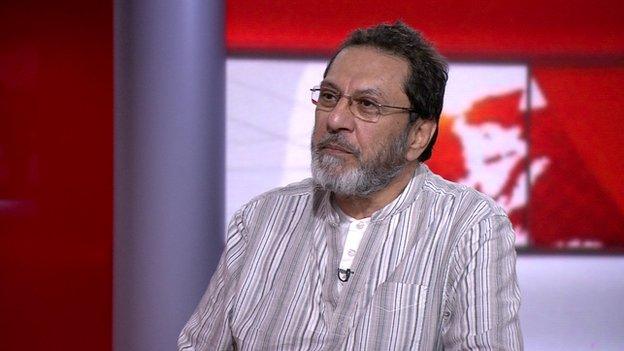
Massoud Shadjareh said it was "misguided and dangerous" to blame the ideology of Islam for extremism
Massoud Shadjareh from the Islamic Human Rights Commission said it was "misguided and dangerous" to suggest that the solution was to tackle the ideology of Islam.
"The government for a very long time had associated barbaric groups like ISIS with not just Muslims, but the ideology of Islam - that they are somehow inter-tangled. The reality is that's not the case," he said.
But former radical Muslim recruiter Abu Muntasir agreed with Mr Cameron that families play a vital role in stopping young people from becoming radicalised.
He told ITV's Good Morning Britain: "There is grooming, no doubt - I know how we used to convince people by ignoring a lot of facts on the ground, ignoring reality and alternative views amongst Muslims and Muslim teaching."
Dr Shuja Shafi, secretary general of the Muslim Council of Britain said he agreed with the prime minister that "finger-pointing when it comes to radicalisation is wrong and dangerous".
Combating radicalisation
Kalsoom Bashir, director of counter-extremism organisation Inspire, said older generations needed to show young people "it is possible to be a devout and true Muslim and to live a free and fulfilling life here in the UK".
Jonathan Russell of the Quilliam Foundation, a counter-extremism think tank, said moderate Muslims "can be part of the solution" and must "take a role in a civil society response to extremism".
In his speech, Mr Cameron also said the UK would work with the UN to "modestly expand" the numbers of Syrian refugees it takes.
The UK has previously committed to take in 500 migrants from Syria over three years. Sources indicated that the government was now prepared to accept "a few hundred more".
He also talked about work being done to tackle online propaganda used by IS, with a British police officer being seconded to a new EU internet referral unit working with the industry to remove jihadist content.
Representatives of a number of faiths met at a mosque in Leeds earlier to discuss combating radicalisation.

Tracking Britain's jihadists
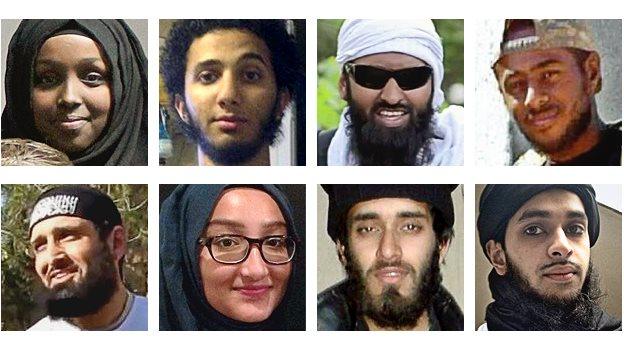
The stories of those who have died, been convicted of offences relating to the Islamic State conflict or are still in Syria or Iraq.

- Published19 June 2015

- Published18 June 2015
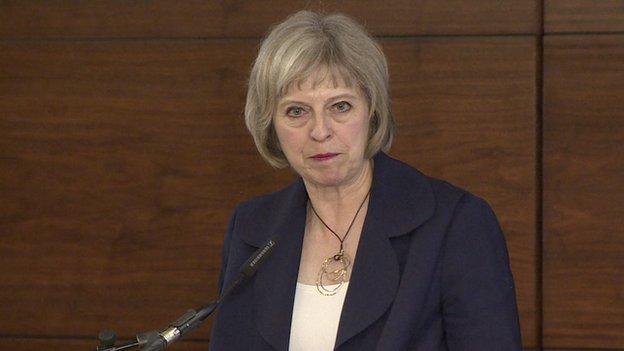
- Published17 June 2015

- Published15 June 2015
